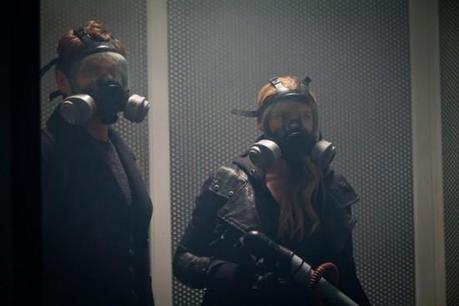Contributor: John Keegan
Written by J. H. Wyman
Directed by J. H. Wyman
Bringing a trilogy of episodes to a solid conclusion is a difficult task. Also bringing a full season arc to its natural and fitting conclusion is even more difficult. Wrapping up an entire five-season series at the exact same time is well nigh impossible. And yet, “Fringe” has come to its final conclusion with one of the finest examples of a series finale in recent memory.

As a disclaimer, I will openly admit that this is not a perfect example of storytelling. The episode does have its flaws. The hand-waving explanation for Walter’s disappearance from the timeline, as well as the absence of any real exploration of how Peter and Olivia would meet without September’s interference of Walternate’s experiments in Alt-Fringe, could be a show-stopper for some. But often a masterpiece is notable for how it transcends its flaws, and delivers better on its promises than a technically proficient 9/10 ever could.
Two themes have dominated “Fringe” since the beginning: the victory of the potential of the human mind over seemingly insurmountable challenges, and the deep and abiding power of love. Both sound trite to cynical, modern sensibilities, yet these are enduring messages. Much of “Fringe” has been the exploration of these themes in various permutations and combinations of time, space, and incurable romantics, so it is fitting that it be the crux of the solution to the Observer threat.
So much of this episode was about bringing the series full circle, but the more I examine it, the more impressed I am. While I balk at any claim that the series was pre-planned in detail (as it clearly wasn’t), I think it’s safe to say that the writing staff had this ending in mind, and worked out what the beats of the story would need to be to get from “Letters of Transit” to “An Enemy of Fate”. Very little of the season seems out of place, now that the ending is revealed. What didn’t serve the plot served the emotional underpinning of the character dynamics.
Even so, there are callbacks to everything that has happened in the series since the beginning. On the surface, the method of Olivia and Peter’s assault on the Observer compound is a great way of reminding the audience of the earlier cases related to The Pattern, when that was the only connective tissue apparent within the series. But taking it further, it is also a thematic payoff for the various incarnations of ZFT. ZFT was a terrorist organization that used advanced technology to fight the unchecked amoral progression of technology. Given that the Observers are the end result of a scientific project to engineer a better human, they embody that amoral progression. And thus, by using the product of “fringe” science against the Observers, our favorite team has essentially become ZFT!
It leads to the question: was David Robert Jones correct in thinking that Olivia, at the very least, needed to be trained to fight the threats posed by unchecked technological advancement? It was her abilities that allowed them to overcome the mad plans of William Bell, and she was a key part of the success of their plan to defeat the Observers and take humanity down a more balanced path. Just as the definitions of “terrorist” and “freedom fighter” are often a matter of perspective, DRJ could have been doing the right thing for the right reasons, just with the wrong methods.
Considering how much of the story of “Fringe” has been about fathers and sons, going back to the pilot and the rift between Walter and Peter, it is fitting that it is so inherent to the character dynamics in this finale. The obvious one is how Walter and Peter have finally come to terms, in two scenes that are practically designed to reduce the audience to tears. Nicely layered into that was the September/Michael relationship, which while relatively new, made sense of September’s motivations over the course of the series. Broadening out from father/son to parent/child, there is also the compelling reward of restoring Etta back into their lives, in a world where they shouldn’t be separated.
The writers delve into mythological territory by invoking the notion of the son eclipsing the father. Peter doesn’t metaphorically kill Walter in this finale, but he does have to let Walter go in order for things to be set right. And in complementary fashion, Walter must sacrifice himself to provide his son (and the rest of the world) with a future. Given that the Observers are indirectly an expression of what Walter once championed, as the mad scientist with little or no remorse, sacrificing himself to prevent their existence and save the world is a fitting conclusion to his arc.
I’ve often said that “Fringe” is the refinement of the “Lost” model: less characters to handle and explore, a tighter mythological foundation, and clear, consistent themes. I also consider it a reimagining of “The X-Files”, with a stronger melding of episodic and serialized elements and a better grasp of how to allow a mythology to evolve without getting unmanageable. On both levels, “Fringe” succeeds, and this finale is the crowning bow on an impressive narrative achievement.
Writing: 2/2
Acting: 2/2
Direction: 2/2
Style: 4/4
Final Score: 10/10

